Related Research Articles

A Masonic lodge, also called a private lodge or constituent lodge, is the basic organisational unit of Freemasonry.
In Freemasonry, regularity is one of the factors by which individual Grand Lodges judge whether to recognise one another for the purposes of allowing formal interaction at the Grand Lodge level and visitation by members of other jurisdictions. Each individual Grand Lodge determines which other Grand Lodges it considers Regular.

The Grand Orient de France (GODF) is the oldest and largest of several Freemasonic organizations based in France and is the oldest in Continental Europe. The Grand Orient de France is generally regarded as the "mother lodge" of Continental Freemasonry.
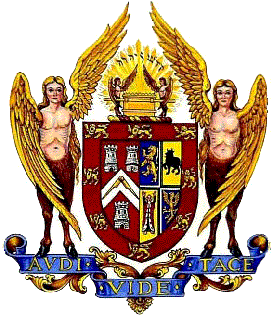
The United Grand Lodge of England (UGLE) is the governing Masonic lodge for the majority of freemasons in England, Wales, and the Commonwealth of Nations. Claiming descent from the Masonic Grand Lodge formed 24 June 1717 at the Goose & Gridiron Tavern in London, it is considered to be the oldest Masonic Grand Lodge in the world, together with the Grand Lodge of Scotland, and the Grand Lodge of Ireland.
Prince Hall Freemasonry is a branch of North American Freemasonry created for African Americans founded by Prince Hall on September 29, 1784. Prince Hall Freemasonry is the oldest and largest predominantly African-American fraternity in the United States.

Freemasonry in Malta has a lengthy history dating from the eighteenth century. The main masonic influences have been from the United Grand Lodge of England, the Grand Lodge of Scotland, and the Grand Lodge of Ireland. Today Regular Freemasonry is under the jurisdiction of the English Constitution since 1815, the Sovereign Grand Lodge of Malta, which was formed in 2004 as well as the Grand Lodge of Scotland.
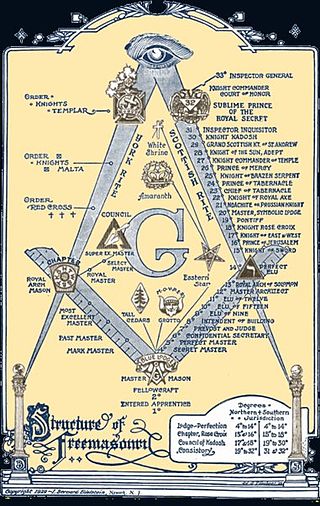
There are many organisations and orders which form part of the widespread fraternity of Freemasonry, each having its own structure and terminology. Collectively these may be referred to as Masonic bodies, Masonic orders, Concordant bodies or appendant bodies of Freemasonry.
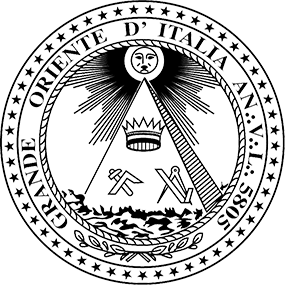
The Grand Orient of Italy (GOI) is an Italian masonic grand lodge founded in 1805; the viceroy Eugene of Beauharnais was instrumental in its establishment. It was based at the Palazzo Giustiniani, Rome, Italy from 1901 until 1985 and is now located at the Villa del Vascello. Its current Grand Master is Antonio Seminario.
This is a general survey on the historical and modern presence of Freemasonry in countries located in Asia.
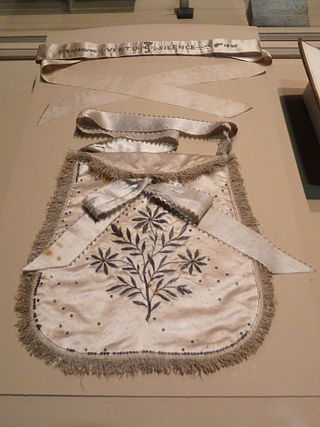
Freemasonry has had a complex relationship with women for centuries. A few women were involved in Freemasonry before the 18th century, despite de jure prohibitions in the Premier Grand Lodge of England.
Freemasonry in Denmark was first established in 1743 and is today represented by a number of Grand Lodges. The oldest and biggest Masonic Grand Lodge in Denmark is the Danish Order of Freemasons, in English also known as the Grand Lodge of Denmark.

This is a chronology of the formation of "regular" or "mainstream" Masonic Grand Lodges in North America, descending from the Premier Grand Lodge of England or its rival, the Antient Grand Lodge of England. A Grand Lodge is the governing body that supervises "Craft" Freemasonry in a particular jurisdiction or geographical area.
Continental Freemasonry, otherwise known as Liberal Freemasonry, Latin Freemasonry, and Adogmatic Freemasonry, includes the Masonic lodges, primarily on the European continent, that recognize the Grand Orient de France (GOdF) or belong to CLIPSAS, SIMPA, TRACIA, CIMAS, COMAM, CATENA, GLUA, or any of various other international organizations of Liberal, i.e., Continental Freemasonry. The larger number of Freemasons, most of whom live in the United States–where Regular Freemasonry holds a virtual monopoly–belong to Masonic lodges that recognize the United Grand Lodge of England and do not recognize Continental Freemasons, regarding them as "irregular".
A Research lodge is a particular type of Masonic lodge which is devoted to Masonic research. It is a lodge, and as such has a charter from some Grand Lodge. However, it does not confer degrees, and restricts membership to Master Masons of some jurisdiction in amity with the jurisdiction that the research lodge is in. Related to research lodges are Masonic research societies, which serve the same purpose but function fundamentally differently. There are research lodges in most countries where Freemasonry exists.
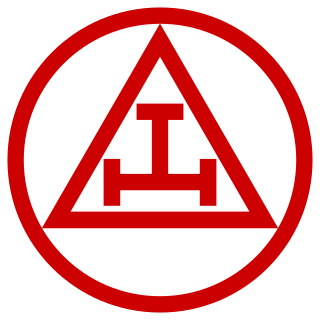
Royal Arch Masonry is the first part of the American York Rite system of Masonic degrees. Royal Arch Masons meet as a Chapter, and the Royal Arch Chapter confers four degrees: Mark Master Mason, Past Master, Most Excellent Master, and Royal Arch Mason.
Continental Freemasonry in North America is relatively rare, but there are a few continental-style organizations active.

The Grand Lodge of Cyprus, or in the Greek language, Μεγάλη Στοά της Κύπρου, is the sovereign governing body of freemasonry within the Republic of Cyprus. Its formal English name is "The Most Worshipful Grand Lodge of Cyprus, Ancient Free and Accepted Masons." While four of its constituent lodges are approaching 100 years of age, the Grand Lodge of Cyprus itself came into being on February 15, 2006. Thus it is one of the youngest grand lodges in the world.
The history of Freemasonry in Ghana can be traced to the early nineteenth century when the first Masonic lodge was consecrated in the country. The practice of Freemasonry was imported to the then Gold Coast and other Commonwealth realms by European residents in the nation during the British colonial era. Most of the lodges in Ghana are governed by the United Grand Lodge of England (UGLE) and Wales, Grand Lodge of Scotland and the Grand Lodge of Ireland. Similar to their sister organisations worldwide, Ghanaian masonic fraternities are nonsectarian, with proceedings of the societies being strictly apolitical and non–religious.
References
- ↑ "United Grand Lodge of England - Foreign Grand Lodges". www.ugle.org.uk. Archived from the original on 22 October 2013. Retrieved 4 March 2018.
- ↑ "HOME > West Virginia Grand Lodge AF & AM". West Virginia Grand Lodge AF & AM. Retrieved 4 March 2018.
- ↑ "PARKERSBURG, WEST VIRGINIA: The Masonic Home". electricearl.com. Retrieved 4 March 2018.
- ↑ Baucher, Todd (9 January 2017). "Commission discusses future uses for West Virginia Masonic Home". Archived from the original on January 11, 2017. Retrieved 4 March 2018.
{{cite news}}: CS1 maint: unfit URL (link) - ↑ The Formation of the Grand Lodge Archived 2016-06-17 at the Wayback Machine from "A Century of Freemasonry", hosted by the West Virginia Grand Lodge
- 1 2 ""Interesting Masonic Event to be Observed". The Gazette Times. April 10, 1915. from Google News.
- ↑ A History of Monroe County, West Virginia
- 1 2 Denslow, William R. "10,000 Famous Freemasons, vol. 1".
- ↑ Cotner, Robert (2011-03-04). "Osiris Noble Frank Buckles, Eldest Shriner, Dies in West Virginia" (PDF). Shrinelines. Archived from the original (PDF) on 2012-03-21.
- ↑ Javers, Eamon (September 28, 2009). "In search of the Hill's Freemasons". Politico . Retrieved 2010-01-12.
- ↑ Beverly, Steve and Chris Tufts. "First-Ever Central Character On "To Tell The Truth" Dies At 86". Daily Game Show Fix.
- ↑ Denslow, William R. "10,000 Famous Freemasons, vol. 4".
- ↑ "Remarks Of The Grand Master Of Masons In West Virginia". West Virginia State Division of Culture and Heritage. Retrieved May 24, 2016.
- 1 2 Clevenger, Andrew (June 9, 2008). "Judge sues W.Va. Masons". Charleston Gazette-Mail. Archived from the original on June 10, 2008.
{{cite news}}: CS1 maint: unfit URL (link) - 1 2 3 Caswell, Cheryl (December 16, 2010). "Jury finds Masons not guilty in case". Charleston Gazette-Mail . Retrieved May 22, 2016.
- 1 2 3 Barry, Dan (16 June 2008). "From Would-Be Reformer, to Former Mason, to Plaintiff". New York Times .
- 1 2 "Expelled Mason in W.Va. sues grand master, lodge". The Herald-Dispatch . Associated Press. June 9, 2008.
- ↑ Ry Rivard (December 3, 2010). "Jury to be selected in Masonic law case". Charleston Gazette-Mail.
- ↑ Christopher Hodapp (December 15, 2010). "Verdict in Haas vs. Grand Lodge of West Virginia AF&AM".
- ↑ Milliken, Fred (February 13, 2013). "PGM Frank Haas Alleged to Have Been Expelled From the Grand Lodge of Ohio Who Previously Granted Him Asylum". Freemason Information. Retrieved May 22, 2016.

